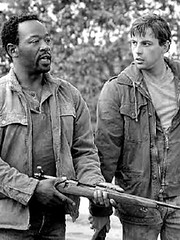With so many restrictions being floated around about social media, including who can blog and under what conditions and with what support, is it any wonder some spokes figures are making a comeback in social media? They are more manageable than CEOs, less accountable, and in some cases (but not all cases) are fun and entertaining.
Originally I was going to write about a spokes figure we helped develop, but then I came across JD. JD is a porcupine who gets a second lease on life after a driver resurrects him using the positive energy found in New Balance shoes.
An Ontario native living in Massachusetts, JD’s MySpace page has all the vitals, including the :30 second back story, his own song, and about 163 friends. If that and his “chipper” attitude aren’t enough to make you feel good, pop over to the interactive Web site, play around with the signage, and enter the enter the balloon-popping contest to win a Jeep, sports equipment, and cash.
JD and the campaign is the brainchild of Almighty that aims at influencing culture. You can find out more about the creators at Ad-titude.com. Like many very creative ideas in advertising, we’re not sure if the ads translated into shoe sales.
That question will best be answered if JD has three lives instead of two. New Balance has named five finalists in an ad agency search that includes Arnold, BBDO, BBH, Cramer-Krasselt, and Element 79 to oversee the $15-20 million ad budget of New Balance. The Almighty could easily retain JD’s piece ... or not.
For the sake of feel good social media, we hope JD survives — even if one of the new shops creates a campaign that aims to bring us back to reality. The concept of the spots, by the way, is linked to NB Zip’s “high performance cushioning technology.” Yeah, okay, sure, the defibrillator shoe soles idea was a bit of a stretch in terms of connecting the dots, but we still like many of the campaign elements that came out of that idea.

Originally I was going to write about a spokes figure we helped develop, but then I came across JD. JD is a porcupine who gets a second lease on life after a driver resurrects him using the positive energy found in New Balance shoes.
An Ontario native living in Massachusetts, JD’s MySpace page has all the vitals, including the :30 second back story, his own song, and about 163 friends. If that and his “chipper” attitude aren’t enough to make you feel good, pop over to the interactive Web site, play around with the signage, and enter the enter the balloon-popping contest to win a Jeep, sports equipment, and cash.
JD and the campaign is the brainchild of Almighty that aims at influencing culture. You can find out more about the creators at Ad-titude.com. Like many very creative ideas in advertising, we’re not sure if the ads translated into shoe sales.
That question will best be answered if JD has three lives instead of two. New Balance has named five finalists in an ad agency search that includes Arnold, BBDO, BBH, Cramer-Krasselt, and Element 79 to oversee the $15-20 million ad budget of New Balance. The Almighty could easily retain JD’s piece ... or not.
For the sake of feel good social media, we hope JD survives — even if one of the new shops creates a campaign that aims to bring us back to reality. The concept of the spots, by the way, is linked to NB Zip’s “high performance cushioning technology.” Yeah, okay, sure, the defibrillator shoe soles idea was a bit of a stretch in terms of connecting the dots, but we still like many of the campaign elements that came out of that idea.





















